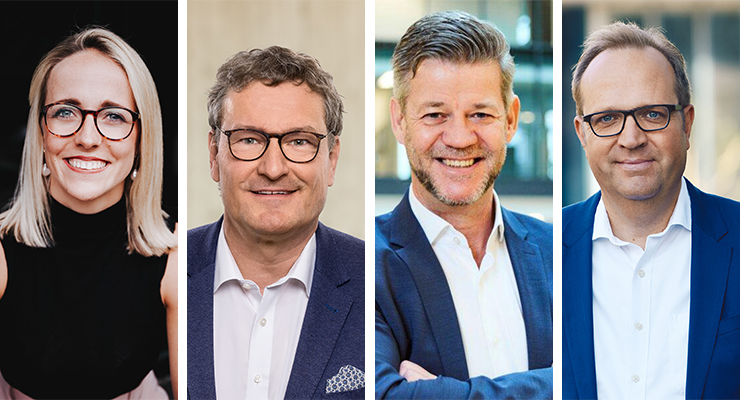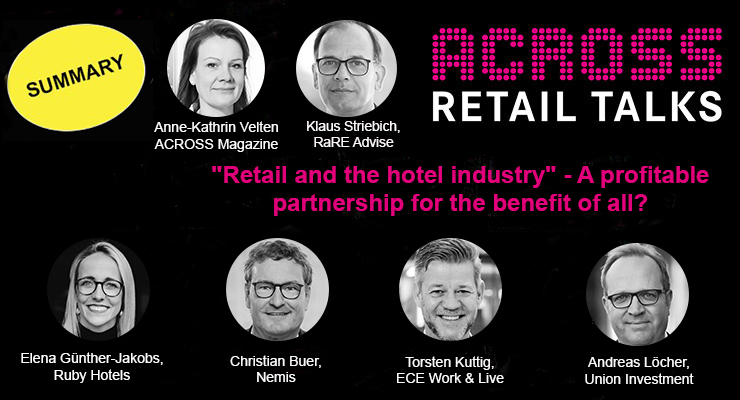The moderator of the ACROSS Retail Talk is Klaus Striebich (RaRE Advise).
The discussants of this episode are:
- Elena Günther-Jakobs, Associate Director Development Northern & Central Europe at Ruby Hotels
- Christian Buer, Professor of Business Administration and Hotel Real Estate & Financing and Head of Tourism & Hospitality; founder of Nemis
- Torsten Kuttig, Director ECE Work & Live GmbH
- Andreas Löcher, Head of Investment Management Operational at Union Investment Real Estate GmbH

Swift Recovery In The Hotel Industry
Elena Günther-Jakobs of Ruby Hotels states that operational recovery is far advanced in most markets, KPI are at or even above pre-pandemic levels. Average room rate in 2024 was 26% above 2019 levels; occupancy rate is still lagging behind a bit though. This is aided by people being motivated to go out a lot more after the pandemic. “For operational costs, we work with 100% green electricity, so prices for us did not skyrocket as much as for other operators”, said Günther-Jakobs. “Overall, the pandemic has shown Ruby´s ability to adapt very well to the challenges.”
Christian Buer agrees that the market has bounced back but also elaborates on some challenges. The pickup rate — short notice rate when booking a hotel — is currently very prominent. For hoteliers, it is not as easy to plan with a consistency, as one day they might have a 90% occupancy rate, whereas on the next day only 40%. This, in turn, strongly influences the profit. In revenue management, revenue indicators have to be changed, because the classical indicators are not good enough anymore. “What is a full-service hotel going to do?”, he asked. “That is the challenge of the future. While luxury brands are well-established for this development, other segments are much less so.”
Andreas Löcher agrees, and states that there is an apparent polarization of the hotel sector, where lower and upper-end hotels are doing overall better than the ones in the mid-market. “This change has been influenced by customers´ price sensitivity, which is much less present for visitors of high-end hotels”. Löcher explains. Ultimately, the target group has become much smaller, which makes it necessary to be more precise when choosing the locations. This development has also caused a shrinking in the number of personnel at mid-range hotels, which only adds to the challenges.
Torsten Kuttig shares his opinion from a developer´s perspective by saying that it is important to have a strong operator who is able to get good room rates, and has good enough operational costs to be able to pay good rent. “Nowadays, developing new hotels has become much more difficult due to a lack of space, as well as ESG conformities”, Kuttig argues. “If you concentrate on existing buildings, you need operators who are flexible, because shopping center developers try to maximize the sales area, and we try to maximize the number of rooms that we can offer to the operator.”
Retail And Hotel As One Asset
Günther-Jakobs: Ruby opened a Hotel in “Das Gerber” in Stuttgart. “Das Gerber” in Stuttgart is an example of a revitalization of a former single-use shopping center into a mixed use complex. “We had previously gained a lot of experience in redesigning and transforming offices into holtes. Now to realize a mall extension with the addition of a hotel was a major milestone for us”, Günther-Jakobs explains. “With this project however, we had to adjust to the traditional special features of malls, and address a general lack of natural light, among other challenges. This resulted in us having to develop a completely new room type for this conversion to able to properly address the deep spaces.” When making synergies such as this conversion happen, it is crucial to not only create revenues but also customer satisfaction and loyalty. The advantage of being in a mixed-use property is, above all, to offer the guests a wider range of services, such as covering gastronomy, leisure and medical needs. “This is also visible at “Das Gerber” where we have higher foot traffic between the mall and hotel, since customers from shopping malls come over to enjoy a drink in our public areas when starting or closing their day at the mall.”
Buer: For achieving higher rent, the question is: what is the space you are taking over, and what could be the added value behind it? An international brand and a multi-purpose building can be combined perfectly. At destinations where there is a high demand for tourism, there is also a huge VIT return figure. Thus, whenever the necessary space is available, achieving higher rent makes perfect sense. With enough demand, even if there is no prime entrance area, simply the space on another floor can be used, while making the most of the available space. Development in the future can only be a win-win-win situation including investors, developers, hoteliers, etc., if you can tighten the building, and make it more profitable on the space per sq m.
Kuttig: Nowadays, even at A locations prices have gone down dramatically when compared to two-to-three years ago. “We are facing much lower purchase prices for hotel developments, new or refurbished”, says Kuttig. “ECE is therefore mainly focusing on A locations when it comes to business, retail and leisure. As for leisure locations in a strict sense, they have to be very good ones that do not raise any doubts. Unlike for the majority of hotel developments, when adding hotels to malls, we also consider B and C locations.” A good operator is extremly important. The choosen one should not only be a good fit for the mall but also for the location in general. There are good chances to make positive profits for the existing investors at these locations.
Löcher: “At Berlin´s Alexanderplatz, we have the ALEXA center, which is very successful”, says Löcher. “Here you have big hotels and retail assets that are creating indirect snyergies, in order to shape and improve the neighborhood.” At such locations, the offers extend way over the normal opening hours, and offer visitors a lot of possiblitites even into the late evening.
Watch the whole talk here:
Take aways for the present and future:

Torsten Kuttig: “For investors and owners of centers, look more towards multifunctional concepts in order to have long-term success with your product and investment. When it comes to integrating hotels, it is important to find the right partners who can help in bringing more benefits to the property and location. Look for the right partner to help you bringing all these interests together.”

Christian Buer: “Start thinking out of the box. Think about what could be a generator that makes your real estate investment more successful. In other words, focus on which key aspects make the locations successful, and for that having the right partners is indispensable. It is not always the big ones, but could be those that make the other investments more profitable as well.”

Elena Günther-Jakobs: “Focus on mixed-use and fexibility, as well as on convenience, becasue no one wants to queue whether in a mall or a hotel. Also, addressing the need for unique and personalized experience is important, as it applies both to hotel and real estate sectors. For that purpose, making good use of technology to better understand the customers is necessary.”

Andreas Löcher: “Optimizing the space at mixed-use developments is key, also from a real estate viewpoint. Moreover, be it in the shopping or hotel sectors, creating “experiences” is important. Finally, learning from each other, by, e.g., creating comparable KPIs would also bring a lot of benefits, and result in an even more intricate synergy between the two sectors.”






